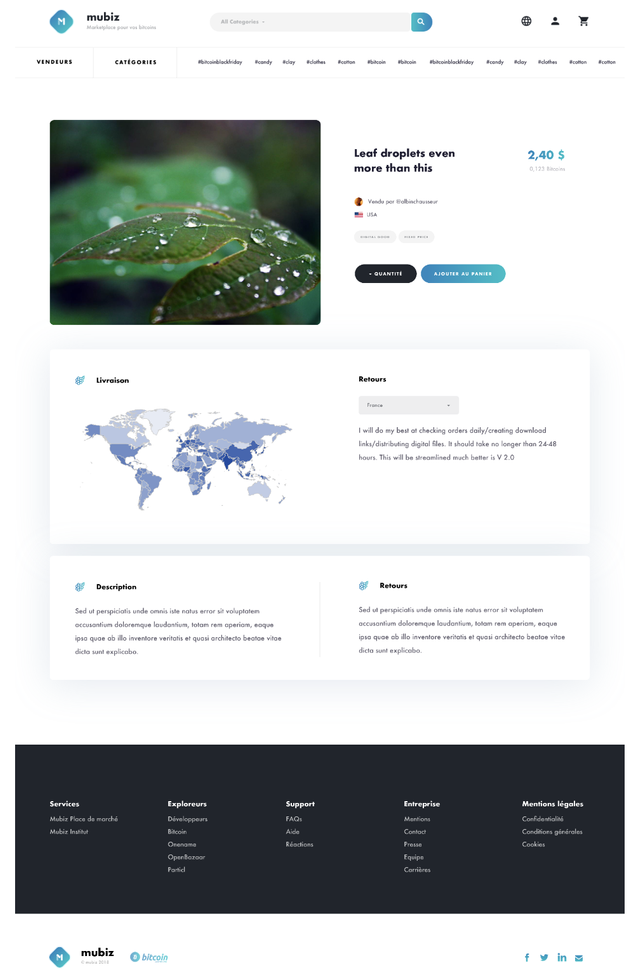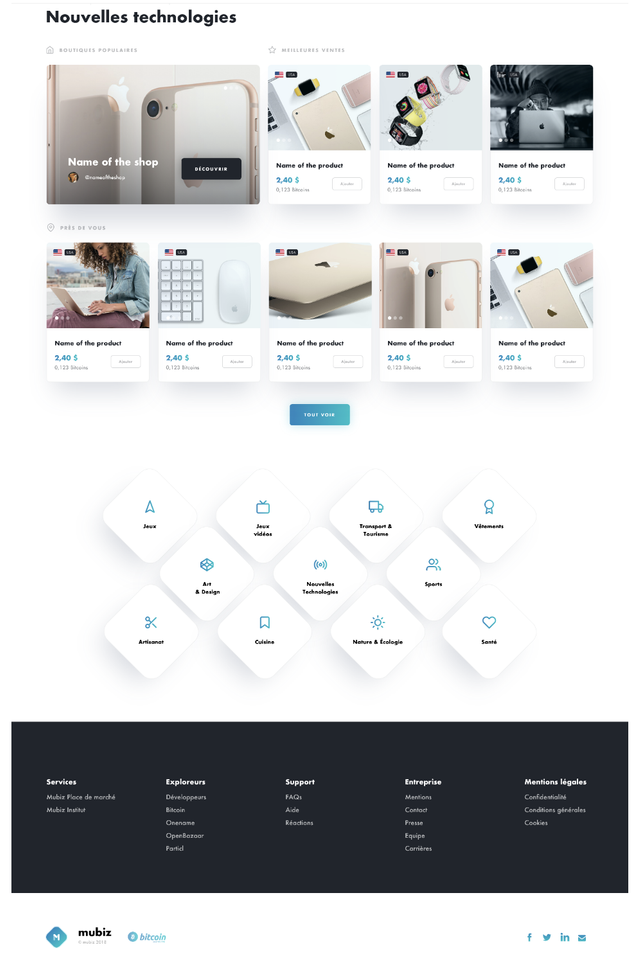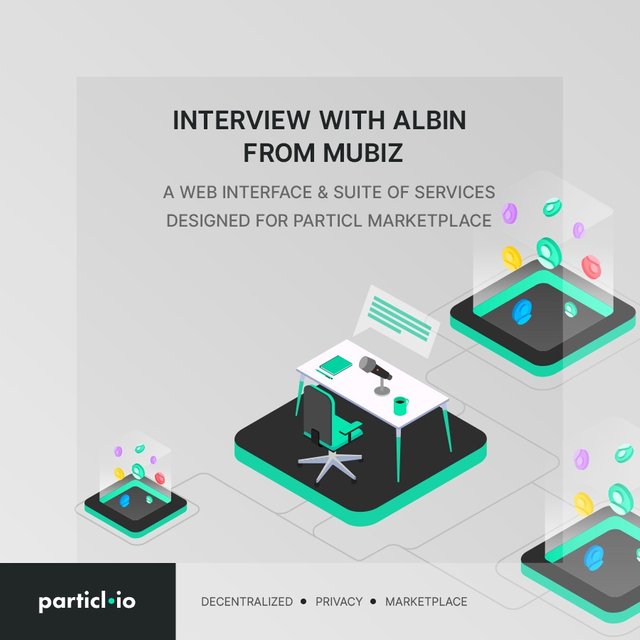Interview with Albin from Mubiz, a Web Interface & Suite of Services Designed for Particl Marketplace

A few weeks ago, I had the opportunity to interview Albin Cauderlier, Founder of Mubiz, a decentralized marketplace gateway that offers a direct access from the web as well as a wide range of services to complement these marketplaces.Mubiz has been around for some time, supporting only OpenBazaar during the way. Albin has, however, been a big fan of the Particl project for some time now and has exciting plans for the decentralized marketplace that will be laid down in this very interview.Mubiz is also currently undergoing a major revamping process where the website’s interface, UI/UX, and services will be entirely redesigned and rebranded. This comes in perfect timing with the release of the Particl Marketplace, make sure you do not miss the exclusive sneak peeks included at the end of this interview which gives a tentative overview of what the refined platform may look like (still a work-in-progress, however).Note: This interview was conducted in French and had to be translated into English. Although some parts of the interview have been paraphrased by this writer, the entire interview has been approved by Albin itself before publishing.
Questions about Albin
Can you briefly introduce yourself?

Albin Cauderlier, Founder of Mubiz.com
Then, at random, I met the three founders of Paymium, a European web-based exchange that supports all bitcoin transactions between consumers and traders, at a coffee shop. They explained to me that they were about to launch a new exchange, Paymium, for a new groundbreaking currency (Bitcoin), one controlled by no central authority (and thus, devoid of fraud), intrinsically valuable, and entirely digital. I, like many others at the time, initially thought they were big dreamers, but I quickly understood, upon studying Bitcoin, just how much of a technological revolution Bitcoin was for the world.I then started talking about it to anyone I knew, including within the offices of the payment processors I was working for at the time, which definitely was not, at the time, the best thing to do. Shortly thereafter, I decided to quit my job to start my own company, E-mProvement which had for mission making cryptocurrencies more approachable and comprehensive for executives and business leaders in France. During the following two years, I gave a lot of formations and produced a lot of prototypes for banks, insurers, retailers, and etc. This ultimately led me to discover OpenBazaar and create the Mubiz platform.
What makes you so interested in cryptocurrencies and decentralized marketplaces? What drew you into these industries?
I discovered and got interested by cryptocurrencies through my experience and jobs within the payment processing industry 8 years ago. It is a very stimulating industry because it is extremely competitive, global, and requires its participants to act with speed, efficiency, and constancy in order to survive.In 2015, we were about only 30 professional individuals that had a strong faith in and understood Bitcoin. Yet, we were all coming from different industries and areas of expertise: cryptography, IT, economy, accounting, web marketing, banking, insurance, health, and etc. The fact that we were so few interested in it and that we were all coming from different industries led us to be considered as people of references in France. This is what encouraged me to form Mubiz, I knew that, if done right, I could become a person of reference for cryptocurrency-based eCommerce, thus leading me to meet more people and go through valuable experiences which would allow me to gain more knowledge in the cryptocurrency field.
What impact do you see decentralized marketplaces having on the eCommerce industry and why?
E-Commerce is usually only a subpart of a vendor’s business model. Retail locations (i.e. outlets), small boutiques (i.e. mom and pop shops), eCommerce platforms (i.e. eBay, Amazon, Alibaba), classified advertisement marketplaces (Craigslist, Kijiji, Le Bon Coin), and etc are merely channels for vendors to gain exposure and sell their goods and services. Decentralized marketplaces, although a novel concept, are one more channel vendors will be able to use.Let’s suppose you are a wine producer and vendor. You produce bottles at around $5 each, which are then in turn resold by a wine retailer (i.e. Nicolas) at $6 each. It becomes risky for you to sell your bottles on Amazon as well, as you risk losing your contract with the aforementioned wine retailer. Most likely, you wouldn’t risk it because the negative effect of losing your contract with the wine retailer, which brings the majority of your revenues in, is much bigger than the slim gain in profits coming from selling on Amazon (because Amazon charges huge fees that undercut your profit margin). You would also end up with a lot of unsold merchandise should you lose your wine retailing contract.Now let’s suppose that you could have an easy way to be directly in contact with your final customer, the actual person buying your wine to drink it. Let’s suppose that way of getting in contact with that customer was very similar to Amazon, offering most of its features, but without undercutting vendors’ profit margins. Now losing that contract with the wine retailer isn’t as big of a shock for you (the producer), because you now have access to a new, more cost-efficient channel to sell your products.It is that kind of research in cost/profit optimization as well as in profit margin/risk management for vendors which leads me to believe that within the next 5 to 10 years, decentralized marketplaces could have serious mainstream potential. In fact, it is well possible that within that time, people will use decentralized marketplaces to buy and sell anything simply because vendors will have caught on to the increase in profit margin and will offer the same products available elsewhere, but at much cheaper prices for buyers and higher profit margin for vendors.Editor’s note: Albin makes a good point here. Vendors will end up being attracted to decentralized marketplaces because they will allow them to make more profit per sales. This, in turn, allows them to lower their prices to gain a competitive edge against their competition by not selling on decentralized marketplaces. It is possible and arguably likely that, as other vendors realize their competitors are making more profits than they are by selling cheaper on decentralized marketplaces, they, too, will want to partake in this new opportunity. It should have a ripple effect over time.
Questions about Mubiz

Can you describe what Mubiz is?
Simply put, Mubiz is a comprehensive suite of solutions for the three main barriers to entry of decentralized marketplaces. The first in the list of solutions Mubiz is providing is a web interface for both wallet and marketplace features. This saves users from having to download the client (in Particl’s case: Particl Desktop) on their devices and get right in the action simply by browsing our website. The second solution we provide is the exhaustivity of the listed products as well as an effective and long-reaching search engine that allows users to easily and quickly find the products they want. This solution, in particular, is especially useful in the case of OpenBazaar, another decentralized marketplace supported by Mubiz, where the data is only stored once on the vendor’s node. The third solution provided by our company is the integration of payment gateways of various natures, as in not only cryptocurrencies. As a matter of fact, Mubiz will be accepting banking/credit card payments as well as potentially Paypal, DCI, and etc. This, of course, will be done according to the various laws and will, ultimately, instantly convert into Particl just like any other non-PART Particl Marketplace transaction.Thanks to these three services we will be providing, we’ll be able to offer to users an eCommerce experience no different than any other centralized marketplace as well as reducing the technical, psychological, and logistical difficulties brought by this new technology (i.e. we will manage the escrow & double deposits, returns, customer service, and etc) by taking care of all the technical stuff.
Any thoughts about the redesign of the website?
I, with the UX recommendations made by Louis Dubruel, initially coded and designed most of the current front-end for Mubiz. Even though the end result is alright, we’ve received a lot of feedback and suggestions from our users which made us realize that it was necessary to hire a professional team to redesign and optimize our UI/UX.Ewa Novak, a professional UI/UX designer, has accepted to help and advise us in completely revamping the Mubiz interface. The new interface is designed to be more modern, refined, smooth, as well as putting more focus on the products rather than the Mubiz brand.Ewa made a lot of suggestions such as the display of a map for deliveries, using more icons to limit text, a refined charter, logo, homepage, and etc.While the redesign of Mubiz was initially planned for Summer of 2018, the delays observed with the Particl Marketplace actually granted us more time to work on our interface which is a good thing in and of itself.
Will the new website be mobile friendly?
Yes, the entire website is designed to be responsive, thus compatible with all devices. For this reason, we do not plan on developing a mobile application for the moment as we believe the website will be usable enough from mobile. This could be a future roadmap item for us, and that is something that we will evaluate as we move forward.
What kind of legal framework are you building Mubiz on? More details about the legal steps being undertaken to protect Mubiz legally (and from what)
Mubiz is a company registered in Switzerland and operating within the Swiss legal framework. We have consulted lawyers to draft our General Terms & Conditions document as well as the handling of personal data. The biggest difficulty for us is that we are required by law to be in charge of customer service and product returns. That means we will be required to refund customers that are not satisfied with their product and receive the returned products.The returned products will be sold back by Mubiz, under our very own store and eCommerce channels, and we thus reserve ourselves the right to not provide services for a vendor if its customer satisfaction rate is inferior to the minimum sales profit margin we identify for Mubiz. This will keep us from losing money due to bad products and/or vendor practices.
Will users have to KYC/AML themselves to use your platform?
According to the law, KYC/AML identification is required for users looking to spend more than 250€ a day. Mubiz has measures in place to detect users trying to bypass that limit. As we do not currently manage KYC/AML identifications, we thus limit carts at 250€ per day for the moment. This is definitely part of our roadmap!
What methods of payment will ultimately be available to users?
We currently accept payments through Coinbase: Bitcoin, Ether, Litecoin, and etc. We will be working on the integration of regular payments through banking cards as soon as the Particl Marketplace goes live on mainnet.We are also considering switching our payment processor from Coinbase to Bity (which has fiat options) in the coming months.
Will it be currency-agnostic? As in, will you accept many coins? Which ones?
Cryptocurrency users will be able and should have no trouble using Particl Marketplace directly from Particl Desktop, which will have crypto-agnostic capabilities; Mubiz probably isn’t very useful for them. Mubiz has for mission to make the decentralized marketplaces it supports more accessible to the general public by offering more traditional means of payments such as banking cards, Paypal, American Express, DCI, and etc.
How exactly will Mubiz deal with escrow, shipping, returns, and customer support?
Mubiz will take care of the entire MAD escrow process for the end user (the buyer). Also, in order to provide an experience no different than any other eCommerce platform, Mubiz will pay the double deposit on behalf of the buyer as well. As precautionary measures, however, Mubiz will impose a few constraints:
- Always the same escrow percentage rate
- Free shipping to our warehouse so that we can manage the shipping of products available on Mubiz
- The right of service refusal if the customer satisfaction is rate is too low such that we cannot make profits or break even with their products
In that sense, would you say Mubiz is going to act as an Amazon-like entity?
Our priority is to focus on the buyer side of the equation. Services for vendors, such as importing listings from other eCommerce platforms like Amazon, for example, has been identified as a potential long-term roadmap item. We want to first offer a fully comprehensive set of solutions for buyers first, and once that is nailed down, we’ll be looking into expanding our services to the vendor side should it make sense to do so at the time.
Will Mubiz be able to eliminate the volatility of the escrow system for vendors?
Our mission is to provide users with a seamless experience no different than any other eCommerce platform. As such, we’ve started working, together with Bity, on a solution to mitigate the risks caused by the crypto/fiat volatility. Once that is nailed down, we will then start working on a way to mitigate the volatility of funds when held in escrow.
Will the experience on Mubiz be as private as directly using Particl Marketplace?
No. Users looking for the best privacy set up will want, and rightly so, to use Particl Marketplace directly within Particl Desktop. Mubiz is not focused on privacy, but rather on usability.Editor’s note: Mubiz states that, while their service requires some data to be harvested from their users, they will be fully compliant with Swiss and European laws, including the recent and widely-talked-about GDPR legal and privacy framework.
Will every vendor willing to sell on Mubiz have to ship your products to your shipping facility?
By default, every product listed on Particl Marketplace that fits our legal framework will be available on Mubiz. There is no opt-in or opt-out. If a buyer wishes to buy a certain product, we will make an offer to the vendor which will then have the opportunity or not to accept it and ship his product, at no charge, to our shipping facility. This means that any product purchased through Mubiz will first need to go through our own shipping facility, and will at the same time gain the whole suite of services offered by our platform such as customer service, returns, escrow management on behalf of the customer, and etc. This will be up to the vendor to accept our services or not.
What products will be listed on Mubiz?
By default, Mubiz will not make available products if they are not legal within all the countries we ship to. For example, you will never see firearms, drugs/cannabis, pharmaceuticals, and other similar items for sale on Mubiz. Our General Terms & Conditions contain an entire section about the listing restrictions.It’s important not to forget that Mubiz is a legally registered and licensed company in Switzerland, we must abide by the law in its entirety. Furthermore, we desire to bring the decentralized marketplaces we support the exposure they deserve. It is only logical that we would filter items as our target users are “mainstream users” (as in, anyone shopping online) and expects a clean environment; advanced users and those looking for items not available on Mubiz can always download Particl Desktop and purchase their items on there.Finally, any package that goes through our shipping facility and is found to contain illicit goods will obviously be properly reported to the local authorities.
What is your experience operating Mubiz using OpenBazaar?
We are extremely grateful towards OpenBazaar for proving decentralized marketplaces could be done. They opened the door to a new market that is poised to grow immensely within the next few years. The OpenBazaar developers are people we have the utmost respect for considering the risk they took taking such a leap of faith and building what had never been done before. I personally consider them as heroes.That being said, not often does the first solution ends up being the most effective one, and we identify a few issues with OpenBazaar which will end up limiting both its development and adoption. We believe Mubiz should now be seeking out to other solutions in order to find which ones could improve on OB’s first proof-of-concept. For example, we found it extremely difficult to integrate nodes, build a crawler, and build on top of it a working search engine. We, in the end, succeeded in doing so, but it took a lot of resources to accomplish.To be clear, Mubiz aims at being marketplace-agnostic, meaning that we want to host many different decentralized marketplaces that fit our vision and values. This is why we want to continue our support for OpenBazaar, and would only stop supporting a decentralized marketplace if its maintenance cannot be guaranteed to the community anymore of if its features/mission does not correspond to our values anymore.
What have you learned operating in the decentralized marketplace industry for the last few years?
The decentralized marketplace sector is very promising because it adds so much value and benefits to the end-user of an industry that’s already pretty big. Just like we had decentralized email services, then decentralized currencies and payment methods, now decentralized marketplaces are coming to revolutionize an industry in dire needs of disruption.However, unlike cryptocurrency projects, the development of decentralized marketplaces is not a process that can be automatically or quickly profitable for the organization or individuals working on them. I actually believe it is much more profitable, as it stands today, for a developer to be working on some cryptocurrency in the hopes that the currency would pump, rather than be working on a decentralized marketplace project (as it is much more difficult to build and not necessarily tied to a speculative currency). It’s ironic and sad because, in the end, we are historically much more likely to remember the disruption caused by these new marketplaces rather than yet another currency out of thousands.
What attracts you towards Particl in general and in comparison with OpenBazaar or other decentralized marketplaces?
Particl has been built with the issues and shortcomings of other decentralized marketplaces in mind. Particl has, on top of this, its own blockchain, thus its own currency and wallet, features that are most definitely useful for us as it makes it that much easier to add new features and functionalities to the protocol, as required, as well as financially incentivizing developers to produce a solid protocol.As a side-note but related to this topic, I believe it is highly improbable that we ever see a serious decentralized marketplace operate over the Ethereum network, in part because of its performance and block saturation. I also do not really believe in the future of projects that are steering away from their open-source and open-ended nature and rather identifying themselves or large corporate companies, such as Syscoin.
What’s the biggest obstacle you see in OpenBazaar to reach adoption?
For one, the OpenBazaar platform’s response time is way too cumbersome to expect a satisfactory enough user experience that could rival well established and centralized eCommerce platforms. As long as simply loading the description of an item will take north of 5 seconds, we can’t really expect the platform to gain “mainstream adoption”.
Will users be able to leave a review once they completed a verified transaction?
Yes, once the order is completed, users can leave a review on the page of the item they purchased. These reviews will be displayed on the website for all to see!
How much do you think users will be able to save using decentralized marketplaces?
It’s very hard to tell, that will take months of reliable data to figure out the details. It can be estimated, more or less, that the retailing margin is around 20%. From this, we can speculate that both the vendor and the customer could save 10% off of the cost of the item simply by transacting through a decentralized marketplace instead of through a retail channel.Editor’s note: Here are the fee schedules (in USD) of other popular, centralized eCommerce platforms:
- Amazon (source 1, source 2, source 3): (fixed selling rights fee of $40.00 a month or $0.99 per items) + (variable closing fee, if any) + (referral fee of 6% to 45%, averaging around 15% to 20%) + (variable Amazon Fulfillment fee) + (payment processor fee)
The variable closing fee is applied on media items, the referral fee is a percentage that is taken off of the final item price by the eCommerce platform after each sale and the Amazon Fulfillment fee is the fee you pay for Amazon to manage orders, shipping and products for you.
- eBay (source) : (Per-category insertion/listing fee of $0.35 after your first 50 free monthly listings are used) + (final value fee of around 10% on average taken off after each sale) + (payment processor fee)
- Alibaba (source): (Gold membership for $2,999 (outside China) to $5,000(company in China)) + (escrow fee of 5%) + (payment processor/banking fee)
- Etsy (source): (Optional subscription fee of $20 for all the features) + (Listing fee of $0.20) + (5% transaction/sales fee based on the value of the item + shipping costs) + (payment processor fee)
- Particl (subject to change): (Listing fee projected to be only a few cents) + (currency transaction fee of less than $0.50 or so)
What is your projected release timeframe?
The new Mubiz interface, as well as the new General Terms & Conditions, will likely be made available for October 2018. We will then, at that point, have a few administrative tasks that will be tackled all the way until the end of the year.As for the Particl Marketplace integration onto Mubiz, that will mostly depend on the state of the Particl Marketplace development. For this reason, we cannot give any specific date as to when Particl will be made available on Mubiz, but that will be only a short time after its mainnet release. In fact, on paper, the alpha, testnet version of Particl Marketplace was supposed to have given us the time to work out the full integration, which has been proven to be true, but not at the speed we planned it to. Because of this, Particl will not be available on Mubiz from Day 1 but should be made available only days after its release. For the full, final integration of the marketplace, it will take a few weeks to work out all the kinks.
Do you have a roadmap for Mubiz?
In the short term, we will finalize our interface redesign and UX as well as update our General Terms & Conditions. Then, while we wait for Particl Marketplace to go live, we will complete all the administrative work still required to be done before integrating Particl by the Switzerland authorities.Then, if Particl Marketplace releases by early next year, we will be focusing on putting for sale and managing items as well as offering as many payment options as possible and a solid search engine. Should Particl Marketplace release a bit later, that would leave us more time to optimize the back-end, logistics, commercial support, and other services offered by Mubiz.
End of the Interview
Exclusive Look at Mubiz’s New Interface
As mentioned in this blog post’s introduction as well as throughout the entire interview, Mubiz is completely revamping its platform to make it easier, more modern, and more intuitive to use for any kind of user. We promised you an exclusive look at the new design, and we intend on making good on this promise!Note 1: The new Mubiz interface is currently under development and the following screenshots are subject to change/improvement at any moment! Do not consider these as the final look of Mubiz, but rather a demonstration of where it’s headed in terms of approach.Note 2: If you have ANY suggestion, feedback, or comment about Mubiz’s new design, Albin would like to stress that he is open to hearing your thoughts and that you can reach out to him by email [email protected].
Listing/Product Page

Homepage (1/2)

Homepage (2/2)

And so that concludes our interview with Albin! Mubiz surely is going to provide a key suite of services that will no doubt help make Particl just as accessible as any other eCommerce, with much lesser fees! We are very excited to see third-parties starting to pick the Particl blockchain and building an ecosystem around it, and we sure hope more people will follow suit as we move forward.Stay tuned for more interviews from some of the key people around the Particl project and ecosystem in the coming future!

Coins mentioned in post: